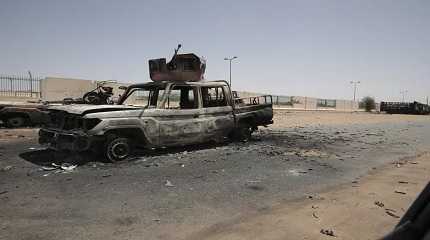
KHARTOUM, Sudan (AP) — Sudan’s top general on Friday declared the military’s commitment to a civilian-led government, an apparent bid for international support days after brutal fighting between his forces and a powerful paramilitary group derailed hopes for the country’s democratic transition.
In his first speech since the conflict engulfed Sudan nearly a week ago, army chief Gen. Abdel Fattah Burhan pledged the military would prevail and secure the vast African nation’s “safe transition to civilian rule.” But for many Sudanese, Burhan’s claim rang hollow 18 months after he joined forces with his current rival to seize power in a coup that cast aside Sudan’s pro-democracy forces.
Burhan’s announcement came on the Muslim Eid al-Fitr holiday, which marks the end of Ramadan and its month of fasting. The day — typically filled with prayer, celebration and feasting — was a somber one in Sudan, as gunshots rang out across the capital of Khartoum and heavy smoke billowed over the skyline. Mosques held mass morning prayers inside to protect worshippers from the intensified fighting, which so far has killed some 300 people.
“We are confident that we will overcome this ordeal with our training, wisdom and strength,” Burhan said in his speech, vowing to preserve “the security and unity of the state.”
“Ruin and destruction and the sound of bullets have left no place for the happiness everyone in our beloved country deserves,” he added.
The video marked the first time Burhan has been seen since violence erupted in Khartoum and other areas of the country.
The explosions and gunfire rocking Khartoum on Friday followed frenzied international calls for a holiday cease-fire. After the United Nations and U.S. Secretary of State Antony Blinken urged a respite from the spiraling violence, Burhan’s military claimed Friday the sides had agreed to a 24-hour ceasefire. Its rival, the paramilitary Rapid Support Forces, also promised to stop fighting for the three days of Eid al-Fitr to allow for evacuations and safe corridors. But such proposed pauses in the fighting have repeatedly collapsed over the past week.
The two generals vying for control over the vast African nation are also vying for acceptance by foreign powers, which have tried to usher in Sudan’s much-awaited transition to democracy. Even as the factions — led by Burhan and Gen. Mohammed Hamdan Dagalo — engaged in international negotiations and sought to portray themselves as supporters of democracy on the world stage, they jointly seized power in a 2021 coup that effectively made them Sudan’s most powerful leaders.
Both Burhan and Dagalo have repeatedly failed to implement agreements that would get them to hand over power, including a 2019 deal struck after the generals turned on long-time autocrat Omar al-Bashir in the wake of a pro-democracy popular uprising against his rule.
Deepening the impasse, Sudan’s military ruled out negotiations with the rival Rapid Support Forces on Thursday, saying it would only accept its surrender.
The military’s stance raised the likelihood of a renewed surge in the violence that has pushed Sudan’s population to the brink and opened a dark and tumultuous chapter in the country’s history. Fears are mounting that the chaos in the strategically located nation could also draw in its neighbors, including Chad, Egypt and Libya.
Both the military and Rapid Support Forces, or RSF, have a long history of human rights abuses in Sudan. The RSF was born out of the Janjaweed militias, which were accused of widespread atrocities when the government deployed them to put down a rebellion in Sudan’s western Darfur region in the early 2000s.




